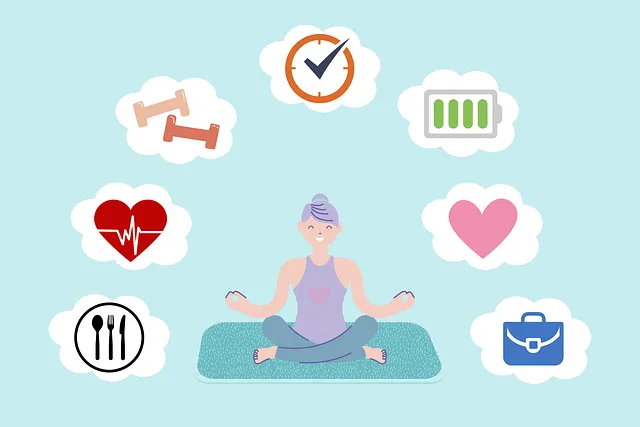Resilience is crucial for healthcare professionals in demanding careers where stress and burnout are common. The Resilience, Flexibility, and Mastery (RFM) framework offers a structured approach to building resilience, helping individuals navigate challenging situations and promote emotional healing. Organizations like Kaiser Colorado Springs provide tailored mental health services, including community outreach and workshops, to support staff well-being. These initiatives empower healthcare workers with burnout prevention strategies, creating a healthier work environment that benefits both employees' mental health and patient care quality. Kaiser's comprehensive approach includes innovative emotional well-being techniques and risk assessments, addressing prevention and treatment needs in Colorado Springs. Integrating RFM exercises into fitness routines enhances overall well-being, reducing depression symptoms and improving mood management, as offered by Kaiser's services in this city.
“Resilience is a powerful tool for navigating life’s challenges. In today’s fast-paced world, understanding and building resilience is more crucial than ever. This article explores the concept of RFM (Recovery, Flexibility, and Mastery) as a framework to enhance resilience. We delve into the significance of resilience-building exercises and highlight Kaiser’s Mental Health Services in Colorado Springs, known for its comprehensive programs. Learn how incorporating RFM into your routine can benefit mental well-being. Discover practical tips to start your journey towards a more resilient you.”
- Understanding RFM: A Framework for Resilience
- The Importance of Resilience Building Exercises
- Kaiser's Mental Health Services in Colorado Springs
- Benefits of Incorporating RFM into Exercise Routines
- Practical Tips for Implementing RFM Exercises
Understanding RFM: A Framework for Resilience

Resilience is a crucial aspect of mental well-being, especially in demanding fields like healthcare. The Resilience, Flexibility, and Mastery (RFM) framework offers a structured approach to building resilience, focusing on three key components. This model helps individuals navigate challenging situations and foster emotional healing processes. By understanding one’s strengths and implementing effective coping mechanisms, healthcare providers can enhance their ability to manage stress and prevent burnout, which is prevalent in the industry, especially with increasing patient demands and complex care scenarios.
In Colorado Springs, organizations like Kaiser offer mental health services tailored to support healthcare professionals’ resilience. These programs often include community outreach initiatives and workshops that educate and empower staff members. Through these initiatives, healthcare providers can access valuable resources, such as burnout prevention strategies, to maintain their well-being. This proactive approach ensures a healthier, more sustainable work environment, benefiting both the mental health of the workforce and the overall quality of patient care.
The Importance of Resilience Building Exercises

Resilience building exercises are essential components of mental health support, and organizations like Kaiser in Colorado Springs recognize their significance. In today’s fast-paced world, where stress and anxiety are prevalent, fostering emotional regulation becomes a top priority for healthcare providers. These exercises aim to empower individuals to navigate life’s challenges with greater ease and flexibility. By participating in activities that promote resilience, people can develop skills to manage difficult emotions, enhance coping strategies, and build mental toughness.
At Kaiser Colorado Springs, the focus on resilience is integrated into various mental health services, addressing not only individual needs but also cultural sensitivity in mental healthcare practice. The exercises are tailored to cater to diverse populations, ensuring that everyone receives personalized support. Through these initiatives, Kaiser aims to provide comprehensive care, offering effective stress reduction methods that go beyond traditional therapy sessions. Such approaches can significantly impact an individual’s overall well-being and resilience in the face of adversity.
Kaiser's Mental Health Services in Colorado Springs

In Colorado Springs, Kaiser’s Mental Health Services stand as a beacon of hope and support for individuals seeking to enhance their mental wellness. This renowned healthcare provider offers a comprehensive range of services designed to promote emotional well-being, catering specifically to the unique needs of the community. Beyond traditional therapy, Kaiser incorporates innovative Emotional Well-being Promotion Techniques into its practice, ensuring that patients receive holistic care tailored to their specific circumstances.
The organization’s commitment to mental health extends beyond its clinical settings. Kaiser professionals undergo rigorous Risk Assessment for Mental Health Professionals, enabling them to recognize and address potential risks within their practices. This proactive approach underscores the facility’s dedication to not only treating mental health issues but also preventing them through early intervention and resilient coping strategies.
Benefits of Incorporating RFM into Exercise Routines

Incorporating RFM (Resilience, Flexibility, and Mental fortitude) into exercise routines offers a multitude of benefits, especially for individuals seeking to enhance their overall well-being. In today’s fast-paced world, stress and anxiety are prevalent, making self-care practices vital. Regular physical activity, combined with RFM exercises, can significantly improve mental health, as evidenced by studies showing reduced symptoms of depression and enhanced mood management. This is particularly relevant for those seeking support in Colorado Springs, where Kaiser offers comprehensive mental health services.
By integrating RFM into your workout regimen, you’re not only strengthening your body but also cultivating a resilient mindset. These exercises are designed to promote flexibility—both physically and mentally—allowing individuals to navigate life’s challenges with greater ease. Cultural competency training for healthcare providers in Colorado Springs highlights the importance of addressing mental health holistically, and incorporating RFM into exercise routines aligns perfectly with this approach.
Practical Tips for Implementing RFM Exercises

Implementing RFM (Resilience, Flexibility, and Mastery) exercises into your routine is a powerful way to build mental fortitude, especially in stressful times. At Kaiser, a leading healthcare provider in Colorado Springs, they offer a range of mental health services designed to support individuals in navigating life’s challenges. One practical tip for integrating RFM is to start small. Begin with simple mindfulness practices or short periods of physical activity tailored to your comfort level. Consistency is key; even brief daily sessions can significantly impact your overall resilience over time.
Consider incorporating structured programs like Stress Reduction Methods, which have been proven effective in various settings. Crisis Intervention Guidance can also be valuable for managing sudden, intense emotions. For a more community-oriented approach, explore or initiate a Community Outreach Program Implementation focusing on mental wellness. These strategies, when adapted to your unique needs, can empower you to build resilience and better cope with life’s curveballs, ensuring a healthier and more balanced lifestyle.
Resilience is a powerful tool for navigating life’s challenges, and integrating RFM (Recovery, Flexibility, and Mastery) principles into exercise routines can significantly enhance mental well-being. As demonstrated by Kaiser’s Mental Health Services in Colorado Springs, these exercises foster adaptability and empowerment. By adopting practical tips outlined in this article, individuals can improve their resilience, just as folks in bustling Colorado Springs have leveraged Kaiser’s services to thrive. Incorporating RFM into daily life does not only benefit mental health but also serves as a testament to the power of proactive wellness strategies.






